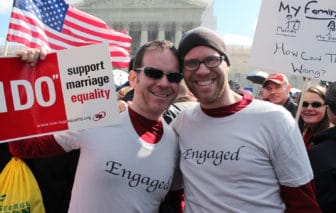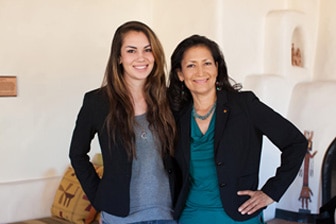This article has been updated.
Many New Mexicans joined people across America on Friday to celebrate the U.S. Supreme Court’s ruling that legalized same-sex marriage nationwide.

Elvert Barnes / Creative Commons
A photo from a marriage equality rally in front of the U.S. Supreme Court on March 26, 2013. On Friday the Court legalized same-sex marriage nationwide. (photo cc info)
New Mexico’s top court made same-sex marriage legal here in 2013. Before Friday, 36 states allowed such unions. The new U.S. Supreme Court decision extended that right nationwide and ensured that same-sex couples who marry in New Mexico will have their unions legally recognized in every state.
“This is a joyous day for families nationwide, and especially for those New Mexico couples who no longer have to fear their marriages will be deemed invalid once they cross state lines,” U.S. Sen. Tom Udall, D-N.M., said in a news release.
In a Facebook conversation I facilitated, some discussed technical points of the court’s ruling and the effects of legalizing same-sex marriage. Some expressed concern about the effect on religious freedom.
Others emoted.
“I ache with joy!” wrote Mariah Harrison of Albuquerque.
“It’s about damn time,” wrote Jamie Bronstein of Las Cruces.

Courtesy photo
Debra Haaland, the chairwoman of the Democratic Party of New Mexico, with her daughter Somáh, who is a lesbian.
Debra Haaland, the chairwoman of the Democratic Party of New Mexico, said her daughter Somáh came out to her as a senior in high school. Today Somáh is 21 and a junior at the University of New Mexico.
“As the mother of a lesbian daughter, I am thrilled to know that her future is free from barriers to marry whomever she wishes,” Haaland said in a release. “I share this victory with her.”
U.S. Rep. Ben Ray Luján, D-N.M., in a news release called Friday “a momentous day for the millions of Americans who now have the freedom to marry and for all those who worked so hard to advocate for equality for all people.”
U.S. Sen. Martin Heinrich, D-N.M., agreed.
“This is an historic moment for the country and it marks a significant step forward to creating a fairer, more just society,” he said in a release.
Mary Collins of Albuquerque wrote on Facebook that she is “very happy for my cousin Bryan Collins who lives in Kentucky and all my friends who now have the same rights that I enjoyed before this ruling.”
New Mexico’s attorney general, Democrat Hector Balderas, called the Court’s decision “an important step toward greater fairness, dignity and equality under the law” in a news release.
U.S. Rep. Michelle Lujan Grisham, D-N.M., said in a news release that there’s still work to do.
“LGBT Americans continue to face discrimination in their communities and workplaces and we must commit ourselves to ensuring that nondiscrimination protections are put in place,” she said.
Religious freedom concerns
Others shared concerns about effect the ruling could have on religious freedom. Once the state “decides to sanction marriage at all, this is not a difficult legal decision,” Daniel Macke of Albuquerque wrote on Facebook about Friday’s ruling.
“Also, I see no need for political hyperventilation,” Macke said. “Even if the state cannot exclude same-sex couples from the definition of marriage, people and institutions who desire to hold true to their view of Biblical marriage can.”
Macke said those differing views can co-exist as long as the state allows people and religious institutions to “continue to define it in accordance with their interpretaton of Scripture. In other words, the state can sanction its marriages; the church can sanction its marriages.”
“My concern is that the states, to include the courts, will not be so tolerant of religious freedom,” Macke wrote.
Mitch Hibbard of Piñon expressed similar sentiment.
“It will be interesting in seeing where redefining marriage will lead,” he wrote on Facebook. “The radical side of it will push the issue with Christian groups and others will now try to redefine marriage to suit their preferences. Who’s to stop them? Slippery slope.”
